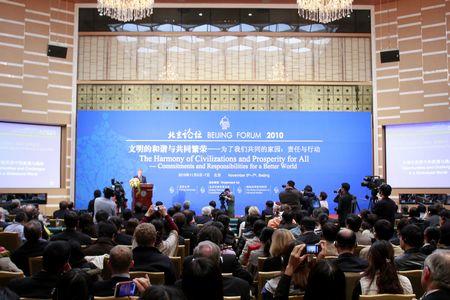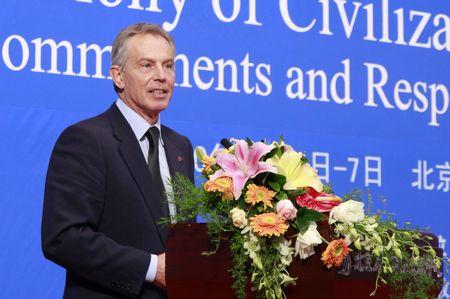Peking University, Nov. 7, 2010: On the morning of Nov. 7, the Beijing Forum 2010 concluded at PKU Yingjie Overseas Exchange Center.
The annual forum opened on Friday with the theme of "the harmony of civilizations and prosperity for all - commitments and responsibilities for a better world." The closing ceremony was highlighted by the speech of a special guest, Tony Blair, former British Prime Minister and patron of the Tony Blair Faith Foundation. Below is the full text:


Challenges and opportunities in a globalised world
In my experience you don t get to understand a country just by reading its political speeches, studying its economic statistics, measuring its output. You understand it best when you understand its culture, its traditions, the special characteristics that have influenced its society, and most of all its people. China s willingness to engage in this issue will greatly assist East-West relations. China has some sixty different ethnic groups. As I have indicated, its religious diversity is obvious. So how China charts its path to a harmonious society will not only matter to the world, but will be something from which we can study and learn. Likewise, how in different parts of the world, religious faith impacts stability and harmony, will be a vital Chinese interest.
However, for those of us in the West, for those in the Middle and Far East and for China, the dilemma is the same: how do we ensure religion and faith play their proper part as a force for good?
I would suggest seven ways in which we can bring about the greater harmony between and within civilisations we seek:
First, we need to recognise and encourage religious faith to express its essential, and in my view more true role, as a source of values, not ideology. Religion, so expressed, is a guide to mutual love and fellowship. It is a means through caring and compassion of creating better functioning, more harmonious societies. Take any of the great religions and you will find there that love of God, and religious worship, is most often demonstrated by love of neighbour. Love your neighbour as yourself ; 'Do unto others as you would have them do unto you ; 'the person who saves one life, saves the lives of all humanity. These phrases, all similar in sentiment, are axiomatic in all major religions. Confucius, a philosopher not a cleric, said, never impose on others what you would not choose for yourself.
Here the boundary between faith and philosophy can be blurred. This is faith as values, as the denial of self in the wider interests of others. Where faith has given rise to acts of great mercy or courage, it has nearly always been of this nature. It has been not about ritual, doctrine, or abstract theology, important though these can be. It has been about human feeling.
Second, we need to discourage faith where it is defined as a badge of identity in opposition to others. Of course, for example, someone who is a Christian believes in the doctrines of Christianity. A Muslim believes in the practice of Islam as laid down in the Koran. So naturally people will identify themselves with their faith and the claims it makes. But though I am a Christian and identify myself as such, I do not and should not disrespect those of a different faith who have taken a different path to salvation. I recognise that I should be humble in the face of God s purpose and not assume mine is the only truth. So just as we expect to have our own faith respected, so we should respect the right of others who have a different faith.
Third, we should study and learn from our own classics and traditions. This is important because it teaches us about how our own faith and culture has developed. Faith is not static. It has evolved. Such study makes us understand that there is an accumulated wisdom and thought that helped create our societies. It reduces the rather arrogant presumption the twenty first century can sometimes represent, that history began ten years ago, in the year 2000. Each of our societies can draw on a rich vein of intellectual, social and philosophical discourse, going back over the centuries, to explain our past and guide our future. This is history every bit as real, sometimes more so, than great events or personalities. In China, for example, this means drawing on the inspiration of philosopher Confucius, and on the religious traditions of Taoism and Buddhism.
Fourth, I would argue that in this era of globalisation, where opportunities for material prosperity have never been greater and thankfully so - the need for a sense of values, of principles, of things grounded in more than simply material advance, is more urgent than ever. Faith, of course, is not the only source of such values. Many people who espouse no faith, can equally assert strongly such thinking from a strictly humanist standpoint. Nonetheless, faith can be a balancing influence as these opportunities and the economic and social changes they bring transform our societies. Faith can provide a certain equilibrium, reminding us of our responsibilities as well as our rights; our duties to others as well as our self-interest. A prime example would be the environment, where we know or should know that we hold it in trust for the next generation and have a strong responsibility to guard it and not spoil it for those that come after us. Faith can give discipline to life. It can diminish the demands of ego. It can stimulate our conscience. Help us to forgive; allow us to rise above vengeance or despair. It can urge us to do good, even when the temptation to do otherwise is strong. It can remind us to ask this fundamental question: what is life for? In this way, too, it can give the same meaning and purpose to how we live within our society, accepting that we are more than simply individuals striving for personal ambition but also members of a community of others.
Fifth, it is therefore right that faith takes its proper place within the debates that interest and exercise our people and our societies. Religious leaders should not try to dictate; but they should have the ability to speak, and to offer their view.
Sixth, to ensure harmony not only within one society but between civilisations, those of faith must accept that just as they have an equal right to participate, such participation must respect the fact that today there will be, in most nations, more than one faith, more than one religious tradition, and that one faith should not try to exercise control or claim greater privilege of citizenship over another.
Seventh, we have the best chance of obtaining the previous six characteristics, if we encourage, promote and activate interfaith harmony and understanding. This is of the essence. If we have more knowledge, we have greater understanding. With greater understanding comes a larger prospect of peaceful co-existence. What we don t know we fear. What we can t understand, closes our mind. It is often ignorance that is at the root of conflict. So we should create not just the feelings but the practical methods of co-operation that lead to co-existence.
The Tony Blair Faith Foundation now operates in many different countries in the world. We have distinct strands to our work. One is academic hence the partnership with Peking University. We began at Yale. We now have seven universities in our programme: Durham, McGill, University of Western Australia, National University of Singapore, Yale, Monterrey Tec and of course Peking. We will have more, including in Asia and the Middle East. Our ambition is to create an academic discipline, with research and publications around the concept of faith and globalisation. This takes religion out of the exclusive preserve of the divinity school and re-unites it with the study of society.
Then we have a schools programme. Three days ago, we just brought San Francisco schools into it. This programme uses the internet technology and carefully constructed pedagogical material, to link up high school students of different faiths and cultures in fifteen countries across the world, from Pakistan, to the UK, from Indonesia to Australia. As students testify, the results are extraordinary and in some cases dramatic, in breaking down barriers.
Then we have an action programme that joins faiths together to contribute to meeting the United Nations Millennium Development Goals. We have started with the anti-malaria campaign. Many poor communities in Africa do not have hospitals or health clinics. But they all have churches or mosques. They can carry out practical public health messages to congregations and communities who are not reached by Government health campaigns. By using their networks and influence, they can make a real impact on eradicating deaths from malaria, treating all faiths equally.
Next year, we will have up and running a new website portal which will give a moving picture of faith in our world today, its trends, its changes and the views of people within the major faiths.
To have China as a partner in this programme of interfaith study, is an honour and opportunity. It allows us to prove that to know the world today we need to know the place of religion within it; that religion may sometimes be a force for bad but it can also, properly expressed, be a force for good and a source of values we require to civilise globalisation. Above all, we can show that a Harmonious Society, and harmony between civilisations, is not an impossible dream, but a practical vision, one that can inspire us to fulfil our responsibilities and create a better world. This world should not only be more prosperous materially, but in spirit also.
I believe such a vision is attainable. I and my foundation in partnership with our friends here in China will work to achieve it.
Extended Reading: A Collection of PKU News Coverage of Beijing Forum 2010
Edited by: Ma Xiao and Jacques
Source: Beijing Forum and Office of Tony Blair
Copyright 2010Peking University News | BeidaNews@pku.edu.cn





